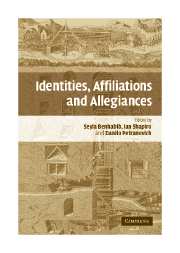12 results
List of figures
-
- Book:
- Identities, Affiliations, and Allegiances
- Published online:
- 05 June 2012
- Print publication:
- 02 August 2007, pp vii-vii
-
- Chapter
- Export citation
List of contributors
-
- Book:
- Identities, Affiliations, and Allegiances
- Published online:
- 05 June 2012
- Print publication:
- 02 August 2007, pp ix-x
-
- Chapter
- Export citation
Part III - Decoupling citizenship from identity
-
- Book:
- Identities, Affiliations, and Allegiances
- Published online:
- 05 June 2012
- Print publication:
- 02 August 2007, pp 179-180
-
- Chapter
- Export citation
Part IV - Identity and historical injustice
-
- Book:
- Identities, Affiliations, and Allegiances
- Published online:
- 05 June 2012
- Print publication:
- 02 August 2007, pp 283-284
-
- Chapter
- Export citation
References
-
- Book:
- Identities, Affiliations, and Allegiances
- Published online:
- 05 June 2012
- Print publication:
- 02 August 2007, pp 386-416
-
- Chapter
- Export citation
Contents
-
- Book:
- Identities, Affiliations, and Allegiances
- Published online:
- 05 June 2012
- Print publication:
- 02 August 2007, pp v-vi
-
- Chapter
- Export citation
Part II - Multiple identities in practice: the European example
-
- Book:
- Identities, Affiliations, and Allegiances
- Published online:
- 05 June 2012
- Print publication:
- 02 August 2007, pp 111-112
-
- Chapter
- Export citation
Frontmatter
-
- Book:
- Identities, Affiliations, and Allegiances
- Published online:
- 05 June 2012
- Print publication:
- 02 August 2007, pp i-iv
-
- Chapter
- Export citation
Part I - Emergence and limits of national political identities
-
- Book:
- Identities, Affiliations, and Allegiances
- Published online:
- 05 June 2012
- Print publication:
- 02 August 2007, pp 15-16
-
- Chapter
- Export citation
List of tables
-
- Book:
- Identities, Affiliations, and Allegiances
- Published online:
- 05 June 2012
- Print publication:
- 02 August 2007, pp viii-viii
-
- Chapter
- Export citation

Identities, Affiliations, and Allegiances
-
- Published online:
- 05 June 2012
- Print publication:
- 02 August 2007
Index
-
- Book:
- Identities, Affiliations, and Allegiances
- Published online:
- 05 June 2012
- Print publication:
- 02 August 2007, pp 417-424
-
- Chapter
- Export citation



